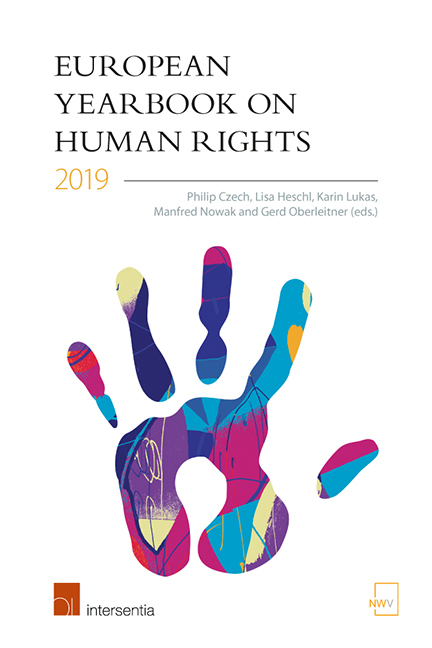Book contents
- Frontmatter
- Miscellaneous Frontmatter
- Editors’ Preface
- Contents
- List of Abbreviations
- List of Contributors
- PART I TOPIC OF THE YEAR
- PART II EU
- PART III CoE
- PART IV OSCE
- Pioneer Decision on Safety of Journalists in the Preceding Context
- If I Could I Would? International Electoral Standards and the Recommendations of Election Observers
- The Right to Political Participation of Persons with Disabilities
- The Right of Children to be Heard through Peaceful Protests
- PART V REPORTS FROM THE FIELD
- PART VI OTHERS
- PART VII BOOK REVIEWS
- Index
If I Could I Would? International Electoral Standards and the Recommendations of Election Observers
from PART IV - OSCE
Published online by Cambridge University Press: 24 January 2020
- Frontmatter
- Miscellaneous Frontmatter
- Editors’ Preface
- Contents
- List of Abbreviations
- List of Contributors
- PART I TOPIC OF THE YEAR
- PART II EU
- PART III CoE
- PART IV OSCE
- Pioneer Decision on Safety of Journalists in the Preceding Context
- If I Could I Would? International Electoral Standards and the Recommendations of Election Observers
- The Right to Political Participation of Persons with Disabilities
- The Right of Children to be Heard through Peaceful Protests
- PART V REPORTS FROM THE FIELD
- PART VI OTHERS
- PART VII BOOK REVIEWS
- Index
Summary
ABSTRACT
International election observers, including missions of the Organization for Security and Cooperation in Europe (OSCE) Office for Democratic Institutions and Human Rights (ODIHR), assess elections against ‘international standards’ for democratic elections. In this contribution we highlight the challenge of defining the content of such standards precisely and point out the observers’ role in developing these standards, including through recommendation-making. In light of this role, we also illustrate the importance of language used by observers in their recommendations, based on our study of recommendations issued by ODIHR election observers in the last three years. We question recommendations couched in unnecessarily soft wording and argue for a more consistent approach to the language of recommendations.
INTRODUCTION
The OSCE/ODIHR mission assessed compliance of the electoral process with OSCE commitments and other international obligations and standards for democratic elections, as well as national legislation. This wording, with slight variations, can nowadays be found in the introductory section of all final reports issued by election observers of the OSCE Office for Democratic Institutions and Human Rights (ODIHR). These reports also contain recommendations addressed to the national authorities, political parties, and other electoral stakeholders aimed at improving compliance with international standards for democratic elections. In this contribution, we explore how election observers understand and apply ‘international electoral standards’ and how this application projects into their recommendation-making.
This contribution consists of two main sections. In the first section, we take a look at the meaning of ‘standards’ in the context of international election observation. We demonstrate the difficulties with trying to define this term precisely. In the second section we explore the language in which ODIHR election observers formulate their recommendations. We draw conclusions from these analyses.
Our research is based on reports by ODIHR and our conclusions are relevant to the institutional practice of this observer organisation. The same considerations may also be applicable to the work of other international observers who follow similar practices in referencing international standards and recommendation-making.
INTERNATIONAL STANDARDS FOR DEMOCRATIC ELECTIONS
WHAT CONSTITUTES ‘STANDARDS’?
Advocates for assessing elections against international human rights law have argued that this approach would help election observers to provide a more nuanced assessment of the process than the simplistic ‘free and fair’ formula.
- Type
- Chapter
- Information
- European Yearbook on Human Rights 2019 , pp. 369 - 382Publisher: IntersentiaPrint publication year: 2019

